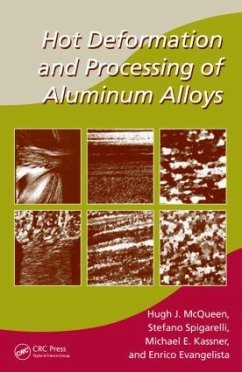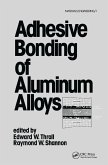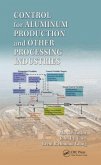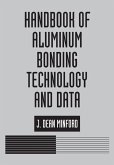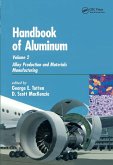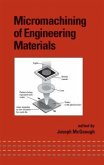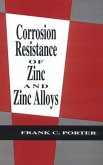Hugh J McQueen, Stefano Spigarelli, Michael E Kassner, Enrico Evangelista
Hot Deformation and Processing of Aluminum Alloys
Hugh J McQueen, Stefano Spigarelli, Michael E Kassner, Enrico Evangelista
Hot Deformation and Processing of Aluminum Alloys
- Gebundenes Buch
- Merkliste
- Auf die Merkliste
- Bewerten Bewerten
- Teilen
- Produkt teilen
- Produkterinnerung
- Produkterinnerung
This reference provides descriptions on techniques relating to the hot deformation of aluminum alloys. It provides detailed explanations on how this process relates to creep, superplasticity, cold working, and annealing processes. Chapter topics include information on hot work testing techniques, quality and defects in industrial processing, metal forming and deformation modes, and dispersoid and solute alloys. In addition, Hot Deformation and Processing of Aluminum Alloys applies individual concepts to processes such as extrusion, rolling, forging, and thermomechanical processing.
Andere Kunden interessierten sich auch für
![Adhesive Bonding of Aluminum Alloys Adhesive Bonding of Aluminum Alloys]() R.W. Shannon / E.W. ThrallAdhesive Bonding of Aluminum Alloys421,99 €
R.W. Shannon / E.W. ThrallAdhesive Bonding of Aluminum Alloys421,99 €![Control for Aluminum Production and Other Processing Industries Control for Aluminum Production and Other Processing Industries]() Mark P TaylorControl for Aluminum Production and Other Processing Industries263,99 €
Mark P TaylorControl for Aluminum Production and Other Processing Industries263,99 €![Handbook of Aluminum Bonding Technology and Data Handbook of Aluminum Bonding Technology and Data]() J D MinfordHandbook of Aluminum Bonding Technology and Data604,99 €
J D MinfordHandbook of Aluminum Bonding Technology and Data604,99 €![Handbook of Aluminum Handbook of Aluminum]() George E. Totten / D. Scott MacKenzieHandbook of Aluminum421,99 €
George E. Totten / D. Scott MacKenzieHandbook of Aluminum421,99 €![Corrosion Protection of Metals and Alloys Using Graphene and Biopolymer Based Nanocomposites Corrosion Protection of Metals and Alloys Using Graphene and Biopolymer Based Nanocomposites]() Corrosion Protection of Metals and Alloys Using Graphene and Biopolymer Based Nanocomposites179,99 €
Corrosion Protection of Metals and Alloys Using Graphene and Biopolymer Based Nanocomposites179,99 €![Micromachining of Engineering Materials Micromachining of Engineering Materials]() J a McGeoughMicromachining of Engineering Materials342,99 €
J a McGeoughMicromachining of Engineering Materials342,99 €![Corrosion Resistance of Zinc and Zinc Alloys Corrosion Resistance of Zinc and Zinc Alloys]() Frank C PorterCorrosion Resistance of Zinc and Zinc Alloys421,99 €
Frank C PorterCorrosion Resistance of Zinc and Zinc Alloys421,99 €-
-
-
This reference provides descriptions on techniques relating to the hot deformation of aluminum alloys. It provides detailed explanations on how this process relates to creep, superplasticity, cold working, and annealing processes. Chapter topics include information on hot work testing techniques, quality and defects in industrial processing, metal forming and deformation modes, and dispersoid and solute alloys. In addition, Hot Deformation and Processing of Aluminum Alloys applies individual concepts to processes such as extrusion, rolling, forging, and thermomechanical processing.
Produktdetails
- Produktdetails
- Verlag: CRC Press
- Seitenzahl: 616
- Erscheinungstermin: 28. September 2011
- Englisch
- Abmessung: 238mm x 159mm x 43mm
- Gewicht: 987g
- ISBN-13: 9781574446784
- ISBN-10: 1574446789
- Artikelnr.: 22176188
- Verlag: CRC Press
- Seitenzahl: 616
- Erscheinungstermin: 28. September 2011
- Englisch
- Abmessung: 238mm x 159mm x 43mm
- Gewicht: 987g
- ISBN-13: 9781574446784
- ISBN-10: 1574446789
- Artikelnr.: 22176188
Hugh J. McQueen is professor emeritus of materials and manufacturing in mechanical engineering at Concordia University and has served one term as the department chair. Since 1965, he has been conducting hot working research in industrial alloys of Al, Cu, Ni and Fe with special emphases on Al alloys and composites and on stainless steels. He has broadened his experience with sabbatical leaves at Comalco and BHP Research Centers (Melbourne), Norwegian Institute for Technology (Trondheim), Universities of Ancona, Erlangen-Nürnberg and Hamburg-Harburg. Professor McQueen also has taught undergraduate and graduate courses in mechanical properties and forming technology and has produced a short film on Dislocations. Before coming to Concordia in 1968, he had conducted research at CANMET and been associate professor at Ecole Polytechnique, Montreal. In 1961, he obtained his Ph.D. in Metallurgy from Notre Dame University (Indiana), following a B.Eng from McGill University in 1956 and a B.Sc from Loyola of Montreal in 1954. He is a fellow of Canadian Institute of Metallurgy, the Institute of Metals, Materials and Minerals the American Society for Metals and of the Canadian Society for Mechanical Engineering. In 2000, he received the Alcan Award in recognition of research and education contributions. From 1986 to 1998, Dr. McQueen served the Metallurgical Society CIM as a member of the Board and as chairs of the Microstructural Science Section and of the Metal Fabrication Section. He organized the International Conference on Strength of Metals and Alloys in Montreal in 1985 and served on its advisory council. Prof. Stefano Spigarelli has been a professor of metallurgy on the engineering faculty at Università Politecnica delle Marche, Ancona, Italy, since April 2005. His research activity is mainly focused on the high-temperature mechanical properties of light metals and steels. His current interests include creep and hot working of steels and aluminium and magnesium alloys, as well as the characterization of nanostructured coatings and the study of non-conventional welding processes and cryogenics treatments. His worldwide scientific collaborations have led to numerous joint publications co-authored by scientists from Japan, Korea, Norway, Israel, Russia, United States and Czech Republic. He has author or co-authored more than 150 published articles and serves as reviewer for several International Journals. Professor Spigarelli is member of Italian Association of Metallurgy (AIM). Prof. Michael Kassner is director of research at the Office of Naval Research. He assumed the position in October 2009, while on leave from the University of Southern California, where he is was made chairman of the mechanical and aerospace engineering department in 2003, as well as a professor of mechanical engineering and materials science. He graduated with a B.S. in Science-Engineering from Northwestern University in 1972, and an M.S. and Ph.D. in materials science and engineering from Stanford University in 1979 and 1981, respectively. Kassner worked at Lawrence Livermore National Laboratory from 1981 to 1990. During that period, he was head of the physical metallurgy and welding section and performed basic research on the mechanical behavior of metals. In 1984, he spent a year on leave as a Fulbright Senior Scholar at the University of Groningen in The Netherlands. In 1990, Kassner accepted a faculty position in the mechanical engineering department at Oregon State University, where he was Northwest Aluminum Professor of Mechanical Engineering, and director of the interdisciplinary Ph.D. program in materials science. Prof. Kassner is currently active in pursuing research at USC on creep, fracture, fatigue and thermodynamics and has published two books-one on the fundamentals of creep plasticity in metals and another on phase diagrams. He has also authored or co-authored more than 200 published articles. He serves on several editorial and review boards for major scientific journals and is a Fellow of American Society of Metals (ASM), a Fellow of the American Society of Mechanical Engineers (ASME) and a Fellow of the American Assoc. for the Advancement of Science (AAAS). Enrico Evangelista is an Emeritus Professor of Metallurgy in Mechanical Engineering at Polytechnical University of Ancona, Italy. He started research on high-temperature internal friction behavior of pure and low-alloyed aluminum at University of Bologna. During a sabbatical, (1980) at Concordia University (Montreal), as visiting research associate, he was introduced to hot deformation of industrial alloys. During subsequent years, he was served as visiting professor at Universities of Trondheim (Norway), Oregon State (USA), Chiba (Japan), and Pohang, (Korea). In the hot working field, he provided practical advice to Italian industry. At University of Ancona, where he became professor of metallurgy in 1983, he created a research group devoted to deformation behavior of metals investigated by means of hot torsion and creep tests. He studied numerous experimental and industrial aluminum alloys and composites, magnesium and titanium alloys, as well as low alloy, stainless and duplex steels. The mechanical behavior was clarified through microstructural investigation by TEM. Professor Evangelista has coauthored more than 250 published papers and is a fellow of ASM. He is also a member of the European Academy of Sciences (EAS) and THERMEC 2011 Distinguished Award recipient.

